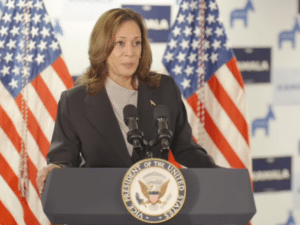The House passed an “assault weapons” ban on Friday in what’s likely to amount to little more than a messaging effort for the midterm elections. But is that message actually going to help those who voted for it?
On the surface, polling indicates this move is a wash at best. The latest Quinnipiac University poll shows support for banning assault weapons has dropped below 50 percent. Gallup puts it a bit higher at 55 percent.
Morning Consult is still showing support over 60 percent. But, like the other polls, it shows no substantial boost in support for the policy following the Uvalde massacre. In fact, all three pollsters have found support for the ban down from its 2019 highs even in the days immediately after the horrific attack.
That makes the ban an outlier among gun-control policies, which saw a spike in support after the shooting. In fact, Gallup found it was the least popular gun-control proposal of the half dozen they asked about–by a whopping 20 points.
Still, it’s clear Democrats are attempting to break the coming red wave in the midterms by rallying their base with wedge issues. Gun control is one of the critical aspects of that push.
There’s some polling that shows where the party got the idea that could work. Quinnipiac’s most recent poll found a plurality of Democrats listed gun violence as the most urgent issue facing America. It also reported 87 percent of Democrats support an assault weapons ban.
Of course, Democrats haven’t actually gotten a ban through. They’ve passed it through the House, yes. But it’s very unlikely to make it through the Senate and into law.
In fact, it probably won’t even get a vote in the Senate. The companion bill there has just 37 cosponsors. Politics is fluid (it seemed unlikely the House would pass the ban just a week or two ago), and more mass shootings involving the guns in question could push the Senate to take up a vote. However, Democrats would be hard-pressed to get more than 40 or 45 yes votes out of the 60 required.
Half-delivering on a longtime priority may not end up being much of a boon at all, even for the activists paying close attention. And it’s not entirely clear how much delivering for gun-control activists matters in getting millions of dollars from them anyway. In much the same way nation-level Republicans still enjoy overwhelming support from gun-rights groups for doing little more than not passing new gun-control laws, Democrats benefit the same way from the polarization of the issue.
After all, where else are the gun-control groups going to go at this point? Only two Republicans voted for this ban. And only one of them, Rep. Brian Fitzpatrick (Pa.), is running for reelection. The other, Rep. Chris Jacobs (N.Y.), has been forced into retirement over his support for the bill.
And once you get past gun-control activists, the appeal of this move becomes even more questionable.
The same Quinnipiac poll that found Democrats overwhelmingly support an assault weapons ban, showed Republicans and Independents oppose the policy. The same survey that IDed gun violence as the most urgent issue, everyone else IDed inflation as the most urgent issue. And they did so by vast margins of over 30 points.
The most recent YouGov poll found 84 percent of respondents rated guns either somewhat or very important. But only four percent said it was the most important issue. That lands guns in a four-way tie for 9th place. Inflation, which 22 percent said was their most important issue, topped the list.
The bipartisan gun bill further complicates the political messaging for Democrats. While several of the polls mentioned above found increased support for stricter gun laws, the gun bill President Joe Biden signed in June could not have happened without Republican support. It undercuts the message that Republicans are holding up gun legislation and may prove to be enough for many Americans who were in the “do something” camp.
Of course, polling isn’t everything in gun policy. It’s instructive to look at the real-world performance of gun-control initiatives as well. Back in 2016, the far-more popular policy of universal background checks was put to a vote in Nevada and Maine.
Despite support for that policy commonly polling in the high 80s or low 90s, both votes wildly underperformed. In Nevada, the initiative did pass but only with 50.45 percent of the vote. In Maine, it failed with just 48.2 percent of the vote.
With assault weapons bans generally polling 30 to 40 points lower than universal background checks, it’s hard to see how the ban helps rather than hurts Democrats even well beyond battleground districts. And history gives instruction on this point. As even some Democrats have noted, the last time they backed a ban like this it hurt the party.
“This is a bill that destroyed the Democrats in ’94. I guess, do we really have a death wish list as Democrats?” Rep. Kurt Schrader (D., Ore.) told Politico. “It undermines what we already did and reemphasizes to all the people in America that are not hardcore urban Democrats that our party’s out of touch.”
Things have certainly changed since the last assault weapons ban. However, one of the things that has changed is the popularity of the guns Democrats are seeking to ban.
Assault weapons is a nebulous term that varies from proposal to proposal. In this case, it applies to semi-automatic centerfire rifles capable of accepting detachable magazines and equipped with one or more banned features, including flash suppressors, barrel shrouds, or pistol grips. But the guns squarely in the sights of this ban are the popular AR-15 and AK-47.
Those guns have enjoyed an incredible resurgence since the previous ban expired in 2004.
More than 24.4 million ARs and AKs have been bought by Americans, according to the National Shooting Sports Foundation. More civilians than ever own these guns, and the AR-15 is the most popular rifle in the country. To give some context, the number ARs and AKs alone are equivalent to about 24 times the number of all guns owned by all of American law enforcement, according to the Small Arms Survey. American-civilian-owned ARs number more than the small arms stockpile of the entire world’s police forces combined.
With upwards of tens of millions of Americans now owning the guns House Democrats just voted to ban, it seems more likely the vote could motivate their opposition better than it could activate their supporters. Instead of countering a toxic political environment for Democrats created by a floundering economy, a symbolic vote to ban popular guns may increase it. With much of the table for the midterms already set, it could be difficult to judge the impact of the vote either way.
We’ll certainly be watching closely for signs of its influence on key races.






